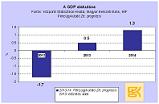| Contact |  |
 |
You are here
Home ›Spontaneous privatisation in Hungary
The phenomenon known as "spontaneous privatisation" is one of the most passionately disputed components in the history of Hungarian privatisation. Some economists and politicians consider the essence of the process to be the disintegration of state enterprises into a group of companies, whereas others regard it as the sale of firms or company sections based on managerial decisions. Most participants in public disputes use spontaneous privatisation as a term of abuse and as a synonym for the conversion of political into economic power or for the preservation of assets, i.e. wasting state assets. In line with this, evaluations are also radically different. At one pole, spontaneous privatisation is an indication of the companies? ability to adapt, but at the other it is equivalent to unlawful acquisition of advantage or even theft.
The basic preconditions for the transition that is unique to Central Eastern Europe in many respects were created by earlier Hungarian reforms. The series of steps taken is a good indication of the continuity and breaking points of the economic and political changes as an important cross section of the disintegration of a centrally planned economy. The question is whether this method could have been an alternative path to privatisation nowhere else followed. How do we evaluate this method of transition subsequently, ten years later? Richly illustrated with contemporary disputes and actual company cases, this book seeks answers to these questions.
ÁPV Rt., (State Privatisation and State Holding Company) "Számadás a talentumról" ("Giving account of the talent") series 1998
| Attachment | Size |
|---|---|
| 28.26 KB |
Financial Research Plc.
IKU Innovation Research Centre
News and events
Working Paper Series
-
11/26/2011 - 15:38
-
11/25/2011 - 16:00
-
11/18/2011 - 20:00
-
08/20/2011 - 15:31
-
07/18/2011 - 19:53



